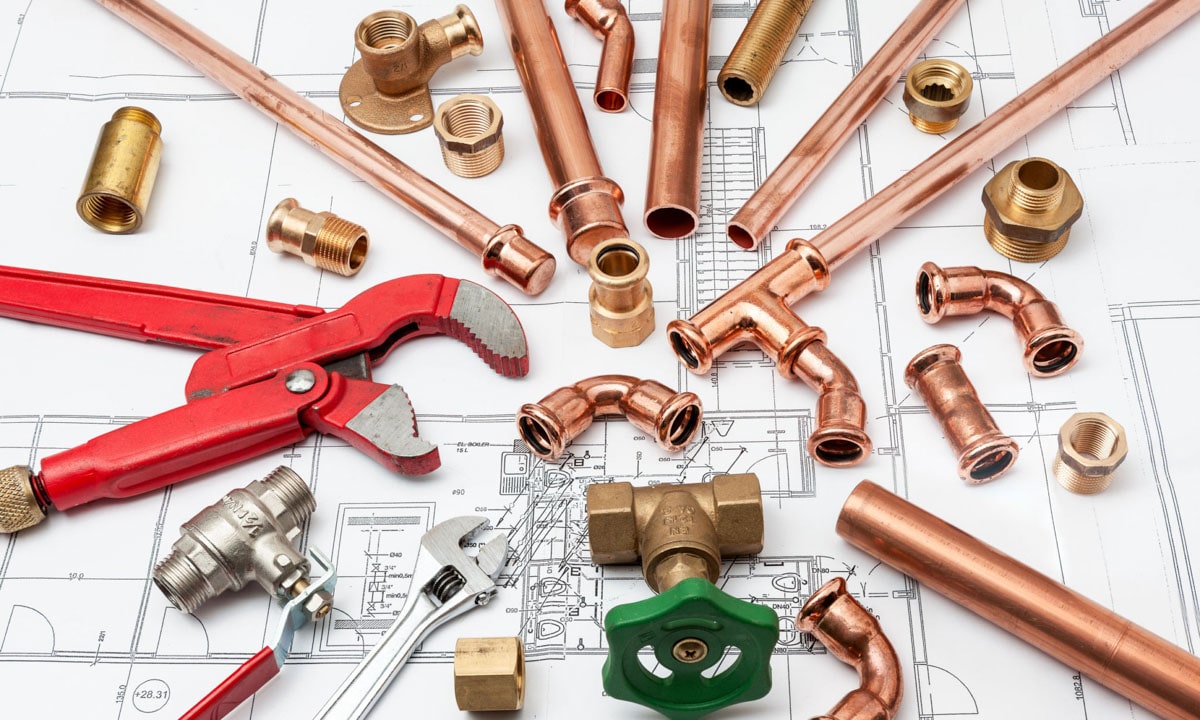Keeping up with the top upcoming plumbing industry trends can provide your business with innovative ideas to stay ahead of the competition.
The bulk of the top trends of the plumbing industry center around smart technology, water efficiency and environmentally-friendly practices.
After reading this article, you’ll discover the biggest upcoming 2024 plumbing industry trends so you can:
- Offer customers the latest smart technology on the market
- New innovative ways to improve water efficiency
- Take advantage of the leading copper alternatives
Stand out from the competition and become the leading plumbing services provider in your area with these top upcoming plumbing industry trends!
1. Smart Plumbing Technology and Fixtures
Plumbing technology continues to evolve—allowing customers to track water usage, identify temperature levels, receive leakage alerts and gain insight on overall data analytics.
Also, new fixtures are becoming standard in the construction of homes and businesses, including:
- Smart toilets: Advanced sensor technologies allow cleaning, disinfection, heated seats and automatic flushing. This market is continually growing year to year.
- Smart water heaters: Have the capabilities of providing your home with hot water when you need it (and turned off when you don’t). This is accomplished by measuring your hot water consumption patterns. They save energy and provide leak detection, which can save around $200 a year in energy savings.
- Touchless sinks and faucets. These fixtures use less water, prevent spreading of germs and bacteria and offer more convenience.
- Leak detectors: Nearly 1 in 50 homes file a water damage claim each year. A leak detection system monitors the water flow through a pipeline. If it recognizes a leak, then it can automatically close a valve.
2. Skilled Labor and Materials Shortage
Another one of the top plumbing industry trends is the skilled labor and materials shortage.
In today’s challenging economy, there’s been a shortage of workers and a shortage of building materials—resulting in higher prices for customers. In fact, the shortage of plumbers cost the US economy $33 billion in 2022 and is expected to escalate. Additionally, a shortage of 557,000 plumbers by 2027 will likely make matters worse.
Concentrating on hiring the best employees is a must when dealing with a tight market. Exploring alternative materials can also help your business.
3. Green Friendly Plumbing
Environmentally friendly, sustainable plumbing practices are becoming one of the more mainstream plumbing industry trends. This includes the use of renewable energy sources for water heating, as well as the installation of greywater systems for irrigation and toilet flushing.
Greywater recycling is gently used water that may appear slightly dirty; however, the water is safe and environmentally beneficial to use.
Other sustainable plumbing practices include the installation of water-efficient fixtures (e.g. low-flow toilets and faucets), as well as the use of environmentally friendly materials and techniques.
Plumbing professionals are also exploring alternative energy sources, such as solar water heaters and rainwater harvesting systems.
Green Plumbing Certification
As sustainability gains importance, a green plumbing certification is becoming a recognized standard in the industry. Plumbers who earn a green plumbing certification are well-versed in environmentally friendly practices and materials.
By employing certified green plumbers, you can gain a competitive advantage in a market where sustainability is increasingly valued. This trend is likely to continue as more regions and municipalities adopt green building codes and regulations.
4. Accessibility
The need for accessible plumbing fixtures is one of the top growing plumbing industry trends as the population ages and people with disabilities require more accessible bathrooms and kitchens.
Fixtures that may need upgrading include:
- Hands-free faucet
- Shower with removable head
- Raising the sink and toilet height
5. Copper Alternatives
The commonly used copper in plumbing is increasing in cost. As a result, there’s been an increase in the use of alternative materials, such as PEX (i.e. cross-linked polyethylene) and PVC (i.e. polyvinyl chloride).
Let’s consider the pros and cons of both:
PEX
Pros: PEX is flexible, which makes it easier to install in tight spaces. It is resistant to corrosion and has a long lifespan. Also, PEX is more affordable than copper and is becoming increasingly popular in residential plumbing applications.
Cons: PEX can be damaged by UV light. Which means, unless it is properly protected, it should not be used in outdoor applications. Some people also have concerns about the safety of PEX, as it is made from a synthetic polymer. Although, it has been deemed safe for use in plumbing by many health and safety organizations.
PVC
Pros: PVC is more affordable than copper and is easy to work with. It is also resistant to corrosion and long-lasting. PVC is commonly used in drain, waste and vent (i.e. DWV) systems, as well as irrigation systems.
Cons: PVC can become brittle over time and may crack or break, especially in colder temperatures. PVC also releases toxic fumes when it burns, which can be a concern in the event of a fire.
6. Backup Water Systems
Many homeowners are investing in backup water pump solutions to protect against power outages. These water-powered backup sump pumps can be the difference between a dry basement and a nightmare flood.
Backup sump pumps are powered by your home’s municipal water pressure rather than (or in addition to) the standard battery-powered emergency backup sump pump systems. Most plumbers are adding this installation and maintenance service to their capabilities.
7. Virtual Services
Virtual plumbing services allow customers to consult with plumbers remotely, providing a safe and convenient option.
Plumbers can diagnose issues, provide guidance on simple repairs, and offer estimates without visiting the property.
While virtual plumbing services cannot replace traditional on-site work entirely, they are a valuable addition to the industry that enhances customer service and flexibility.
Bonus Trend: Automate Daily Tasks With the Best Plumbing Software
When a call comes in that a pipe burst, or a leak is discovered, plumbers have to be on top of their game to handle these emergencies—this is where the top plumbing software is critical.
The #1 plumbing software is rich in features that can make you more profitable and save valuable time. Here are some of the top features to consider when purchasing the best plumbing software for your business.
- Performance Dashboards: Shows a snapshot of your business, including sales, service agreements and profitability.
- Customer Management: Review all completed jobs and confirm what equipment plumbers use. Also, use images to show homeowners what problems exist.
- QuickBooks Integration: Every transaction flows into QuickBooks—completely eliminating double-data entry.
- Service Agreements: A complete picture of when service agreements are due for renewal, billing and scheduling. Plus, automatically send reminders and invoices.
- Price Presentation: Price books help plumbers sell additional equipment and services.
- Quotes and Invoices: Reduce unpaid invoices, get paid faster and identify your top performers.
- Mobile CRM: Run your business from anywhere, create work orders on-the-go and dispatch plumbers from your mobile device.
Want to save money and time? Schedule a personalized FieldEdge demo today!
Scale Faster With These Upcoming 2024 Plumbing Industry Trends
Use these top upcoming 2024 plumbing industry trends to:
- Close more sales
- Improve customer satisfaction
- Provide memorable, high-quality services
Use these key insights into the top 2024 plumbing industry trends to increase profits, scale faster and make this another phenomenal year!




